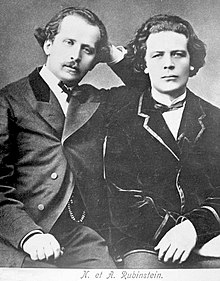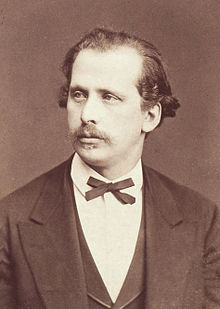Nikolai Grigoryevich Rubinstein
Nikolai Grigoryevich Rubinstein ( Russian Николай Григорьевич Рубинштейн ., Scientific transliteration Nikolai Rubinstein Grigor'evic ; born June 2, jul. / 14. June 1835 greg. In Moscow , † March 11 jul. / 23. March 1881 greg. In Paris ) was a Russian pianist , conductor , music educator and composer .
He is the brother of the composer, pianist and conductor Anton Rubinstein .
Life

Rubinstein began taking piano lessons at the age of four. First with his mother Kalerija Christoforovna born. Löwenstein (1807-1891), who was a teacher at an imperial educational institute and herself an excellent piano player, later with Franz Xaver Gebel and Alexander Villoing , the most respected piano teacher in Moscow at the time. Together with their mother and Villoing, both brothers lived in Berlin from 1844 , where they studied piano with Theodor Kullak and music theory with Siegfried Dehn for three years .
The bankruptcy and imminent death of the father (1807-1847) plunged the family into economic difficulties from 1846 and forced the eleven-year-old Rubinstein to return to Moscow early. There he first appeared as a successful young pianist, but studied law at Moscow University from 1851 to 1855 to secure his livelihood .
After a failed marriage, which was concluded under the condition of being banned from performing, Rubinstein appeared again regularly as a pianist from 1857, especially with benefit concerts, and at the same time established himself as a conductor. Until the beginning of the 1860s he was also active as a composer. He composed incidental music and many works for piano.
His contacts with the Moscow upper class as well as his organizational and diplomatic skills enabled him to support his brother's plans to improve Russian musical life: in 1860 Rubinstein founded the Moscow Department of the Russian Music Society (RMO), for which he worked as president, conductor and choir director. In 1866 he took over the management of the newly opened Moscow Conservatory with Prince Nikolai Petrovich Troubetzkoy, for whom he was able to win influential teachers such as Karl Klindworth and Pyotr Ilyich Tchaikovsky , with whom he was friends. Rubinstein remained associated with this institution as a lecturer and conductor until his untimely death in 1881.
meaning
Like his brother Anton, Nikolai Rubinstein was one of the most important pianists of his time. However, since his work was largely limited to the Moscow area, he received less international recognition. However, even the early teacher Siegfried Dehn considered him the more talented of the two brothers, which Anton recognized without envy, especially since Nikolai's pianistic technique and his interpretive memory were obviously more reliable and the art fell to him with almost no effort or practice.
As a demanding teacher, a virtuoso as well as sensitive pianist, devoted chamber musician and relevant conductor, he attached great importance to the musical quality of the compositions performed and proved to be a great organizational talent. His way of conducting the orchestra made him the founding father of the Moscow Conducting School, and as an interpreter and central figure in Moscow's musical life, he campaigned intensively for Russian composers - also for the members of the Balakirev circle who were critical of his brother .
His students include Sergei Taneyev , Alexander Siloti and Emil von Sauer .
literature
- Anatoly Aleksandrovic Solovcov: Nikolaj Rubinstejn . Moscow 1946 (Russian).
- Milij A. Balakirev: Correspondence with NG Rubinstein and MP Beljajew . Ed .: Vasilij A. Kiselëv. Moscow 1956, OCLC 252252378 (Russian).
- Lev Barenboim: "Nikolai Grigorjewitsch Rubinstein: Life and Work", Moscow 1982/2010.
Web links
- Works by and about Nikolaj G. Rubinstejn in the catalog of the German National Library
- Short biography on klassika.info
- Biography on the Russian online encyclopedia krugosvet.ru
| personal data | |
|---|---|
| SURNAME | Rubinstein, Nikolai Grigoryevich |
| ALTERNATIVE NAMES | Рубинштейн, Николай Григорьевич (Russian); Rubinštejn, Nikolaj Grigor'evič (scientific transliteration) |
| BRIEF DESCRIPTION | Russian pianist, conductor, music teacher and composer |
| DATE OF BIRTH | June 14, 1835 |
| PLACE OF BIRTH | Moscow |
| DATE OF DEATH | March 23, 1881 |
| Place of death | Paris |
